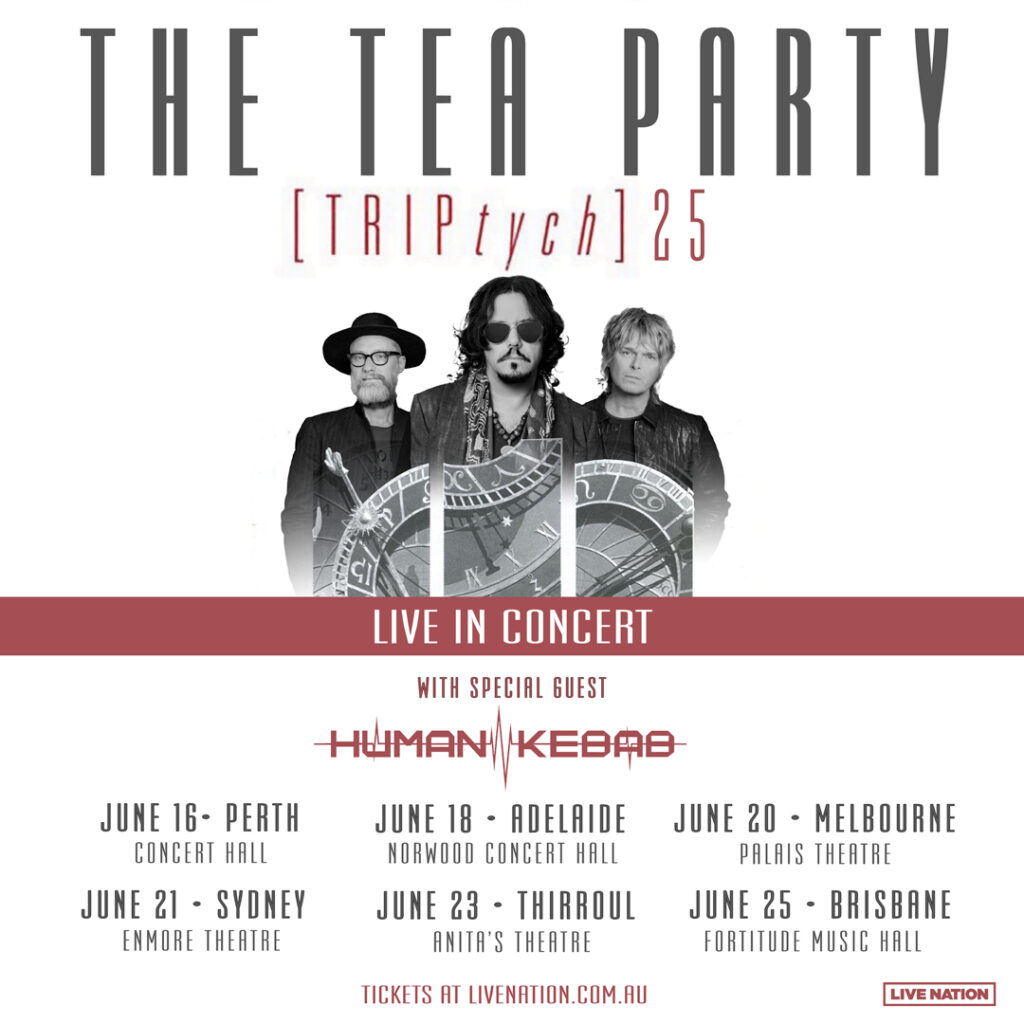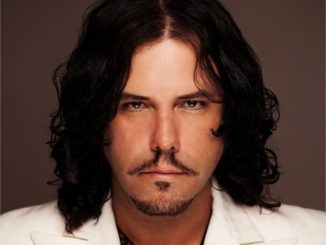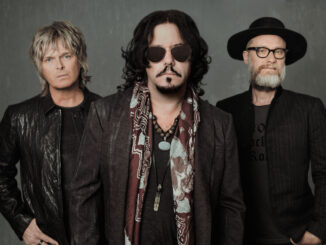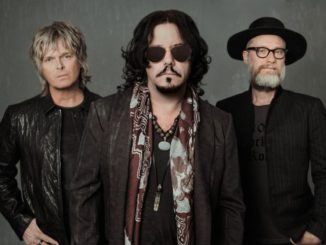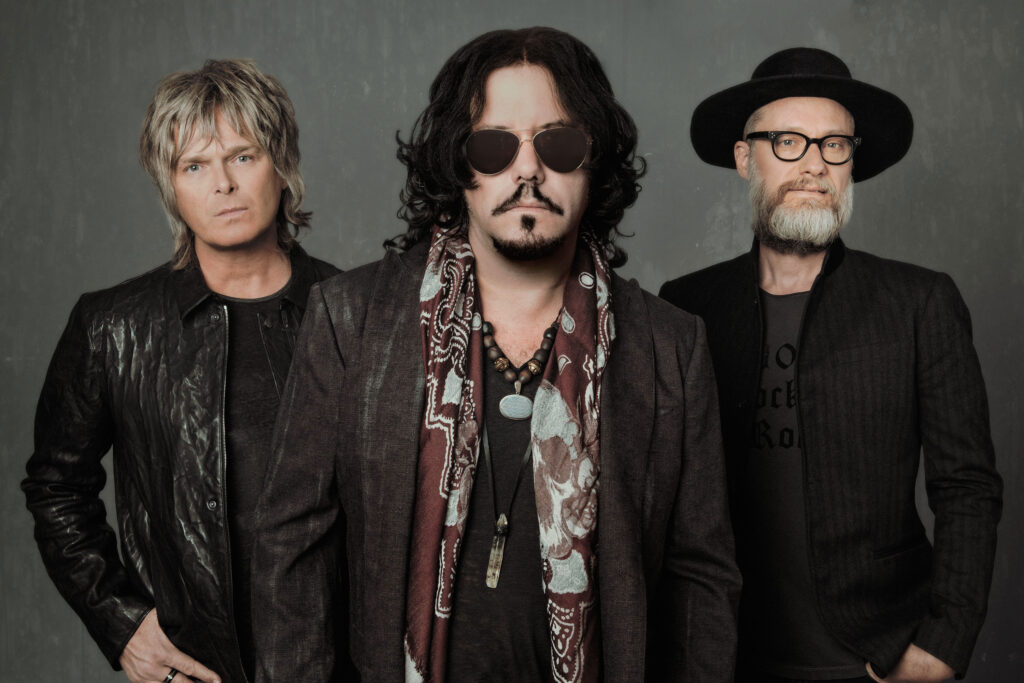
The Rockpit’s Andrew Slaidins had the chance to chat with two members of The Tea Party, Jeff Martin and Jeff Burrows, discussing their album TRIPtych which is celebrating its 25th anniversary this year. They reflected on the recording process, stating it was one of the happiest times for the band artistically. About to embark on a tour to celebrate this landmark anniversary we revisited 1999 and where the band was at during this time.
When asked about the possibility of playing the entire album live, they expressed that they would rather intersperse favourites from other albums. We also touched on their next album, with Jeff Martin confirming that they have started working on new material and hope to release it by the middle of next year.
Chatting with Jeff Burrows a little while we waited for Jeff Martin to join us…
Andrew : Good Morning Jeff, where are you at the moment?
JB : I still live in the Bands hometown, so I’m in Canada about four hours southwest of Toronto. So if you know Toronto, we’re right across from Detroit, essentially.
Andrew : How are things there this time of the year?
JB : It’s amazing. It’s spring and spring has been pretty early this year, so I just got the pool open and we’re redoing my backyard, so I took out this rock garden and we’re leveling it off and we’re putting some more grass in the backyard for our little dog. I feel bad there’s nowhere for her to run.
Andrew : And you’re about to leave it all and come out to Australia?
JB : Yeah, it’s okay, everything is blooming here right now. It’s great, and anytime in Australia is great, really. I don’t mind, I don’t mind the fall weather. That’s my favourite season, but everyone’s pretty chuffed around here. They have pardoned me for the summertime. I think we got Jeff coming in. Hey Jeff, if you can hear me, you’re muted. So just scroll up a little bit and there you go. Yep.
Andrew : Hello, Jeff, how are you?
JM : I’m very well.
Andrew : Thank you both for taking your time out to join me this morning and having a chat with The Rockpit. So, welcome.
JB : Thank you very much. For sake of ease, if you’re going to ask us both the question, Jeff (Martin) will always answer first. Okay. That’s just so that I’m not cutting anybody off.
Andrew : Fantastic. No worries. My questions are all based around both of you. So, this chat’s to celebrate the TRIPtych album, turning twenty five and the imminent tour that’s happening next month, and I can actually say next month now, which is super exciting. The impact of that album for you and the significance of that album for you both, what does it mean to you?
JM : Well, I think for the three of us, well, okay, so our first record, Splendor Solis, we came out of the starting gates. Our wings were pretty wet with our influences. There’s a lot of Zeppelin going on, and I know that a lot of people mistakenly compared me to Jim Morrison. I mean, I get it. I could see it even myself now, but it wasn’t one of my influences back then, but pretty cool to be called Jim Morrison singing in Led Zeppelin. That’s a pretty good band by all accounts, but that was record number one. But really when the band came into its own was the edges of Twilight that defined us and basically stamped our musical sound. That whole exotic Middle Eastern Indian influence into hard rock, like taking our cue from something like Cashmere by Led Zeppelin and just running a lot further with it and then not to stick to rest on our laurels.
Along comes Transmission with its industrial influences and a much darker, darker record for sure. In its tone, poetically and musically, those two records, somehow there was an alchemy that happened between those two records and the influences from those two records became what TRIPtych was and the best of two possible worlds becoming a third. And because of the celebration that’s coming up of the TRIPtych records, I’ve had to start listening to it again. It’s been a while since I’ve listened to it and I’m actually taken aback by the musicianship on the record and also the production, the sounds that we all created together.
When you put headphones on and you listen to that record, things are getting dizzy this whole lot going on. And just hindsight being 2020, just so very proud of the record. And now looking forward to this tour because it’s been too long since the tea parties toured here in Australia. I’ve had the great fortune of doing solo shows and whatnot here over past six years, but it’s a totally different world. When the band gets back to Australia, it’s one of our homes. So to celebrate TRIPtych and to also get into rehearsals before the tour because the boys are going to come up here to the Sunshine Coast where I make my home now. We are going to have some great rehearsal days and try to get into some deep cuts off of TRIPtych and see what we can come up with. It’s going to be a challenge, that’s for sure. But we’ve risen to challenges before and I expect it to be the same.
Andrew : And for you, Jeff Burrows, how do you reflect on the album?
JB : Well, so this album came out in 99, and I think the previous album transmission was what sort of cemented us or made at least us realize that this is real and we’re doing this and we’re fortunate enough to be able to travel a lot like Europe and Australia and New Zealand and Canada and America, and we were really going for it. And it was a very special time leading into what became TRIPtych. And the lead single from that record was a song that Jeff was tooling around with while we were shooting a video on the previous record.
I don’t know, I remember this record quite a bit because I was spending a lot of time in Toronto with my young family at the time, and I specifically remember hearing ‘Heaven Coming Down’ on the radio on Edge 102, which is a very famous radio station in Canada, probably the most famous in Canada for the first time. And it sincerely felt like the first time I ever heard any of our songs on the radio. It was so exciting, the vibe from not that we were ever concerned with what the record company or anyone really felt, but record company to the agency, to management, to promoters, like the feedback, the vibe, everyone was just beside themselves and giddy with hope that this would do very well. And we never really judged the success of an album-on-album sales. It’s always been our live show that meant most to us.
But this record did so very well, and it showed us a different side of things that we had never really been exposed to. Crossover radio and very strange things for three dark guys in a band. So for me, looking back on it, it was really a launch pad for I suppose the second chapter of The Tea Party. I don’t think I could say it in one sense perhaps, because each album is really a different chapter with this band, but that sort of separated the first three albums, and this was a new launchpad per se. So, I look back on it with great fondness and honestly, like Jeff said, getting into the likes of, I was listening to it today again while I was driving around, and some of the deeper cuts are just so much fun. And I look forward to watching Jeff struggle to find how to play these songs on one guitar.
Andrew : It’s one of those albums. I think I went back, look, I can remember when I first heard it at that stage, I was working in music, retail and in a record store, so I remember each album as they launched from Splendor Solis through to Edge Of Twilight, through to Transmission. But there was something about this album that just seemed to be the sum of all thing’s identity wise for you guys. It took the best out of, I guess, where you had decided to go and play previously. And when I say play where you experimented, where you wrote, and where you tried to find, I guess almost a definitive band identity. And this now for me, and certainly the first time I heard ‘Heaven Coming Down’ just floored me at how good it was. Again, like yourselves, I’ve gone back and I’ve revisited the album again over the last week, and it is such an incredible recording and kudos to all three of you for creating something so timeless, I guess. To think twenty-five years has gone by in the blink of an eye, and this could be as fresh today as it was back then, and that’s commendable.
JB : Yeah, I think Jeff deserves some kudos for the production hat on this one. Mind you produced all of, but this one was the chef’s kiss after the first three, and it was just, I think it’d be cool if Jeff, actually, it’d be pretty cool if you went back and even remixed it, Jeff, just to see what’s there.
JM : Yeah, all the ghosts come out now, right? Yeah, right. It would be interesting. But Jeff, I think that triptych, it’s just something intangible about it that I would never want to mess with.
JB : I don’t mean change it, I don’t mean change it, but just fuck around with it a little
JM : Onwards and upwards, my friend. We’ve got new music too make too.
Andrew : I guess it sort of leads into another question that I had. There are quite a few artists out there today that for whatever reasons, legal entanglements, record deals and contracts that were what they were back in the day where in order to celebrate an anniversary that had to go and either re-record or re-release or remix, sorry, that song album, whatever it is, what would you do differently today with that album if you had to?
JM : Honestly, my friend, I personally wouldn’t do anything different. The studio where we recorded, which unfortunately doesn’t exist anymore, but that studio was a magical place. It was in the Laurentian Mountains north Montreal. It was called the Studio Morin Heights. And it was a place where the police recorded synchronicity, David Bowie worked there just so many incredible artists and the vibe of this place, you were so isolated up in the mountains, but had this beautiful family home that we could use. And so we had all our families there and it was a really beautiful time. And just the whole recording process. I mean, I just can’t recall the band ever being that. I mean, of course as The Twilight was something really special of just those influences coming through on that record. But TRIPtych, we were on top of our game and we knew exactly where we were going with that record. And I think that’s the thing that I couldn’t really imagine changing a single thing.
Andrew : That’s fair enough too. I don’t think it needs changing anything. I just thought it was an interesting question given the state of the industry in some ways these days now, I guess it also kind of leads, obviously the question was would you play the album in full? And I guess given the little bit of insight that you’ve given me, Jeff, it’s probably a little tricky to replicate live. Was there a possibility of playing the whole album live, was that ever a consideration for this tour? Playing it back to front?
JM : No.
JB : I’ll take this one. No, honestly, I’m, I’m not a fan of that. I don’t know if those who are coming to the show would want that. I mean, we’d like to intersperse some of the favourites from other albums with these songs, so I’d rather not go boom, boom, boom, boom, all in a row. If it was meant to be perhaps a theme album. I could see doing those types of things. But Jeff’s lyrics and the music written have always been more moods compared to themes. I guess. There’s no theme running through any album. If that was the case, I could maybe see it, but I don’t think we would ever do that.
JM : And also too, you have to keep in mind with songs like Sister Awake and The Bizarre and Temptation, if we didn’t play those songs in a Tea Party concert, we would have on our hands a very angry crowd. So yeah.
Andrew : Yes. Yeah. Oh, that’s perfectly understandable. And you’re right, if you didn’t play those hits, there would be chaos without a doubt. Now, I guess the thing is, in those early days and through those first four or five albums, you guys were releasing like clockwork every two years, a new offering for us, the writing process between all of that, obviously while you guys were out on the road, was a lot of that captured and thought about on the road.
JM : There was certainly a lot of demos occurred on the road. The tour bus can be a very boring place, so you got to fill up your time with something. But normally what would happen with the Tea Party is that I’ve always had recording studios wherever I lived, and so there would always be a demoing process. So for instance, Jeff, it was TRIPtych, wasn’t it? That there was the fire in my place and it ruined the tapes,
JB : I believe. No, you’re talking about the Stone scraping, I thought that was Transmission. Oh
JM : Yeah, that’s right. Yeah, the Stone Scraping. Yeah,
Yeah, yeah. 400 year old Stones.
JM : Yeah. Yeah. So we had done demos for triptych at my recording studio in Montreal, but my place was like 400 years old stone walls, and they were scraping the stones or something, cleaning or whatever, and we were recording on tape and everything was ruined, so we had to start again. And that’s why we actually went to the studio more nights.
JB : Yeah, one more time. Yeah, that’s right. And there’s something about the Gilmore Heights back. I mean, everyone had recorded there from David Bowie to Canadian Band Rush to Keith Richards, to you name it, The Police endlessly, they had done three albums or it was such a vibe and such a cool place. I really wish that was still there.
Andrew : So I guess in the body of work as a band, I mean, you’re both speaking very, very highly and you recognize, I guess that it’s the culmination of everything up until that point. Where does it rank in the historic nature, in the history of the band for you guys,
JM : I think, well, it’s hard ranking because I mean, every record is a different part of our lives, and we were at different stages of our lives. So to rank it, I mean, I can’t rank it, but I can just say it was artistically one of the happiest times that we’ve had. There were some records that were more difficult to make than others, but TRIPtych certainly wasn’t one of them.
JB : Yeah, I could agree with that. This was, if you included our indie album, it was literally five albums in the nineties, 91, 3, 5, 7, and 99, and we wrapped up that decade in a pretty good mood. The album before that was a little moodier to say the least, and Jeff lyrics really reflected that. I think after all the touring after Transmission and all the work that was put in and so on just came out of it feeling pretty damn good. And it showed, I think, on Triptych.
Andrew : Yeah. And throughout your career, I think it’s what I tried to do the calculations on it, but this is tool number 13 to Australia.
JB : I dunno, I think it’s more than that, to be honest. Oh, really? Oh yeah, I know. I’ve been to Australia over 25 times for the band, maybe not all tours, so it’s got to be at least 20, I think. Don’t you? I mean, gosh, the first album, I think we were there four times.
JM : Yeah, no, I’d say it’s getting close to 20. Yeah.
Andrew : And that’s no mean feat within itself. And I mean, it is safe to say, I know Jeff, that you spend, do you spend all of your time here in Australia now or
Yeah, yeah. The Sunshine Coast is where my wife and I, it’s our home and yeah. Well, I’ve been a permanent residence of Australia since 2008.
Andrew : Oh, okay. I didn’t know that. There you go. There you go. That’s really cool too. I know I’ve seen you on numerous occasions through different tours and solo, Jeff, and I mean, yeah, thank you for keeping on, coming out and keeping on, coming out with new music
JM : And Yeah. Well, you guys are stuck, man. You’re stuck with me. So
Andrew : If you had to pick a definitive track from TRIPtych, what would it be?
JM : Mine would be The Halcyon Days, because I mean, that’s all the elements of the Tea Party in one song.
JB : Yeah, Jeff stole mine, to be honest. If you listen to, or if you go on YouTube and you’ll see The Halcyon Days, there’s a live recording of it from a German festival. Do you remember the festival, Jeff? Or do you even know what I’m talking about?
JM : Yeah, I do actually. I’ve seen that footage as well. Was it Rock Am Ring? Something like that.
JB : Oh, maybe Rock Am Ring or Rock Im Park, it was one of those two. And man, we were firing on also and want to talk like, yeah, man, we were great, but honestly, we were so tight and that song was just, it was fucking banger, man. It was so good. So yeah, I’d have to agree with that for sure.
Andrew : Excellent. I’ll go and deep dive check that one out. Thanks guys. Now, obviously talking about that catalogue and hits and those sorts of things, there’s also a second anniversary this year, which is for probably my favourite two party album, Seven Circles, which turns 20 this year.
JB : Oh, there we go.
JM : Would there be plans for a tour, an anniversary tour based around that record?
JB : I’m not sure about that. I love that record.
JM : I’m glad you liked that record, my friend. But that would’ve been one that I would say that was a difficult one to make. There was, just to be perfectly honest, there was just a few too many cooks in the kitchen on that record, and too many opinions flying at us, the three of us that we weren’t used to. It just wasn’t a pleasant experience. The music always going to be proud of the music, but it wasn’t a pleasant experience by any means.
Andrew : Ocean is probably one of my favourite songs of all time, and I think that’s the big launch, that record for me as well, that has significance at the time in my life that yeah, it’s always stuck with me in that record. Got me through a whole heap of stuff, so thank you guys.
JM : Fantastic.
Andrew : Obviously, beyond Seven Circles, I think you’ve kind of alluded that too many cooks in the kitchen, it then took 10 years for the Ocean At The End to come. Was the delay there a direct result of what was going on?
JM : Well, the three of us had to take a break from each other. Probably the pressures, I mean, we had lost our manager, and
Speaking of emotion,
I wrote that song for Steve and losing Steve, we kind of lost the captain of our ship, and the ship went off course. So, we separated for seven years. And I think it was using that term again, hindsight being 2020, but at the time it was painful. But I think the three of us now realized that it had to happen in order for us to come back and truly appreciate what the three of us have together. And making the Ocean At The End was, I think, scary for the three of us going back into a recording studio, me at the helm again as a producer, that took a lot of trust from Jeff and Stewart’s, but that record turned out to be something very special. I mean, wasn’t handled well by the record company, but nonetheless, it’s a proud achievement artistically. I mean, there’s not a song in that record that I don’t like. I mean, it’s very, very strong. And it gave us a taste to continue on. I mean, COVID was hard for every band, and so we put out a couple eps, but I’ve started working on new material for the Tea Party, just schematics that the three of us will work up together. And I think that we’re headed towards some incredible new music shortly, probably in middle of next year, hopefully.
Andrew : Excellent, I know that there are so many rabid Tea Party fans here in Australia, as again, as you said, you guys really have touched us and left a really big mark on us. And in many ways, I think like you sort of said, Jeff, we followed you. I think we also claim you guys as our own to a certain degree. So just in wrapping this up, I just wanted to thank you both, the three of you for an incredible run of albums and tours and music, and this whole TRIPtych celebration I think is going to be an incredible series of shows. Thank you again for coming back and showing us some love for this album as well.
JM : Okay. And we will see you at the Palais in Melbourne?
Andrew : You will indeed, absolutely, Jeff.
JM : Absolutely. Very good. Alright.
JB : Well thanks so much Andrew. We appreciate it, alright. Appreciate your kind words.
Andrew : Yeah, look, I’ve got a bunch of other stuff to ask, but I realize that you guys are on a schedule. Maybe we’ll save that for another time and we’ll just catch up and have some fun with a little 10 quick questions.
JB : That means we’ll have to do another tour. That’s great.
Andrew : Absolutely. Alright gentlemen, thank you both so very much and look forward to seeing you in June.
JM : Alright, take care mate. Bye. Thank you.
JB : Thank you very much, Andrew. Cheers mate. Thanks. Bye.
